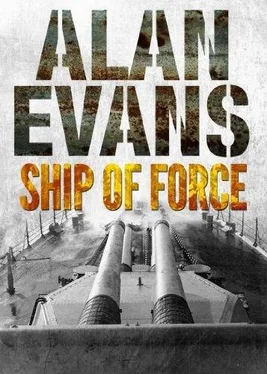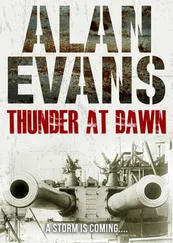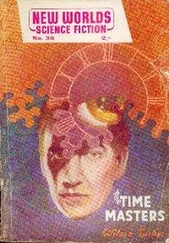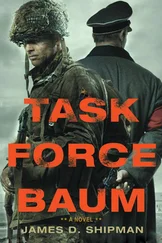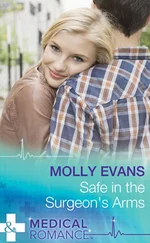Smith gasped, “Point the pistols but no shooting unless they try it. Understood? It’s got to be quiet !” He saw them nod and his eyes swung back to the road.
It was a staff car. He saw that much behind the yellow orbs of its lights as it slowed, a mist of spray rising from its wheels, a leather or canvas top to it but no windows, open at the sides above the doors, two faces in the front…
It halted abreast of him, brakes squealing and only feet short of Josef. A head poked out at either side, one in a round cap, the other in a cap with a peak. A voice snapped a question, curt, impatient.
Smith could see faces in the back of the car now. Two? He shoved out of the ditch and straightened as he took the long stride that brought him up to the car to put his pistol to the face there. “Still!”
Buckley was around the other side, pistol pointing. So was Galt. McGraw was beside Smith and yanking open the rear door with his pistol pointed, threatening. “Keep still ye bastards or ah’ll shoot ye where ye are!”
Smith doubted if the words meant anything to the two soldiers inside but the pistol did. Like the two in front they sat frozen. He snapped, “Get ’em out! Quick! And watch for any tricks!” He eased back half a pace, tugging the door open with his free hand then beckoning: “Out!” They all climbed down, hands lifted above their shoulders. The two in the back were infantrymen, their rifles left in the car. One from the front was the driver, the other, in the peaked cap, was a Major. Smith recognised that rank. He was young and hard-faced and the face was scarred. He was startled and wary but already recovering. He took in Smith’s uniform and those of the men with him and broke into German.
“Shut up!” Smith told him.
For a moment he did. Then he started again. “You are English —”
Smith shoved him towards the ditch, snatched the cap from his head and snarled at him. “Shut your mouth or I’ll shut it for good!”
He sounded as though he meant it. The Major believed him and was silent. But he was angry, not afraid.
Smith said, “Buckley, Galt, cover the other three. Finlay! You and McGraw make this officer fast and gag him. Use his belt, anything that’ll do and sit him in the ditch.”
He left them to it. He heard the start of an angry protest from the Major: “You cannot do —” It was suddenly cut short. Smith suspected the gag had been applied but he was inside the staff car, peering at the controls, trying to identify them from the memory of his one brief attempt at driving. He thought that the Major slipped easily into English and that he was probably another Sanders in reverse, spending long vacations in England before the war.
He heard Buckley say, “Same with the others, sir?” And nodded absently. The engine was still running and that was something. He didn’t have to worry about starting, adjusting the mixture etc. He saw that the safety catch was applied on the Webley then tucked it in his belt and went over the procedure, muttering instructions to himself. He thought he had it — Buckley showed at the window. “All secure, sir.”
He had to do it. “Finlay! McGraw!” As they came up he saw beyond them the heads of the Major and his men sticking out of the ditch at the edge of the road. He’d picked McGraw because he was a fighter and Finlay for his cool head. He would keep McGraw in check. He told all of them what he wanted and then looked at them. McGraw was enjoying himself, that was obvious, but Finlay was poker-faced. He sent those two off, carrying the soldiers’ rifles and running for the path by which they had come.
“All right,” he said, “the rest of you get in.” Buckley sat in the front by Smith. Josef and Galt got in the back. He saw Josef holding the Major’s Mauser pistol, checking the load, smacking the magazine home.
Smith took off his cap and crammed the Major’s on his head so it rested on his ears. He jammed the car into gear and got it moving but jerkily so it shook them and he heard Galt swearing. Then it ran more smoothly and they were bumping over the pave, picking up speed as Smith clung to the wheel. Something moved at the edge of the light, came up at them as they closed the distance between and they saw the patrol they had seen earlier, still making their circuit of the village and about to cross the road. They waited for the car to pass, hunched under the rain and Smith told himself he had been right to order the prisoners to be gagged because a yell now would have given the game away. The patrol squinted against the lights but then the car was past them and running into the village. Smith only had time to be glad the patrol had not come five minutes sooner and then the little square showed ahead of him. He braked and they slowed a little but still swayed drunkenly as they took the tight turn into the square. The headlights swept around the faces of the houses and settled on the door with the two sentries. The car jolted down at them over the cobbles, swerving out and in as Smith swung it desperately around the fountain, straightening…
The car slid to a halt with its front wheels almost on the steps and the engine hiccupped and died. Smith stuck his head out of the side, mouth open to bark, “Komm!” But it was unnecessary: the sentries were already coming down the steps, blinking against the glare of the headlights. One of them saw the Major’s cap and snapped to attention and the other followed suit. Smith said, “Out!” He thrust open the door and pointed his pistol at the nearest sentry. He saw Buckley menacing the other. Galt and Josef came slipping around to snatch the gaping sentries’ rifles and Smith said, “Galt! You hold them!”
“Aye, aye, sir.”
Smith ran at the door, twisted the handle and pushed it open. Beyond was a hall stretching towards the rear of the building. Empty. To the right a staircase led up and he took the stairs on the run, three at a time. On the landing he paused briefly. There were four doors on the landing but light showed under only one and that one of a room that faced the square. Buckley and Josef crowded behind him, breathing heavily. To Buckley he said softly, “Watch our backs.” Then with Josef he moved to the door, paused to take a breath then seized the handle, twisted and shoved and burst in with the opening door.
It was an office. Opposite the door was the curtained window and on either side of the room stood a desk. An orderly sat at a typewriter behind the one on the left. Behind the other on the right sat an officer, bareheaded. His hands rested on the blotter before him. Another Major but this one’s close-cropped head was grizzled and between his hands lay a Mauser automatic pistol like the one Josef held now. Between Smith and the Major sat a woman in a straight-backed chair, her back to Smith. A guard, rifle slung, stood stiffly at her shoulder. It was all taken in with one blink as he stood at the door and those in the room gaped at him, all except the woman who did not turn. For that blink of time all of them were frozen as if posed for a photograph.
Then Josef said, “That’s her!”
The picture broke up, was smashed. The Major snatched at the pistol and fired at the same time as Smith and Josef. The reports were thunderous in the room. Something burred past Smith’s head and the Major, half rising, went backwards over his chair to fall spread-eagled on the floor. The guard was unslinging his rifle but Josef was on him, hitting him wildly across the side of the head with the Mauser, a blow like a man chopping wood that jerked another shot out of the pistol to smash into the ceiling in a spurt of plaster and the guard fell against the desk and then to the floor. Josef grabbed at the woman’s arm and she rose under that urging, turning. She wore a blouse and skirt, both cheap, and a shawl was wrapped around her shoulders. The dress of a peasant woman. Then she turned fully around and Smith saw the face, pale and tight-drawn. It was the face of Eleanor Hurst.
Читать дальше
